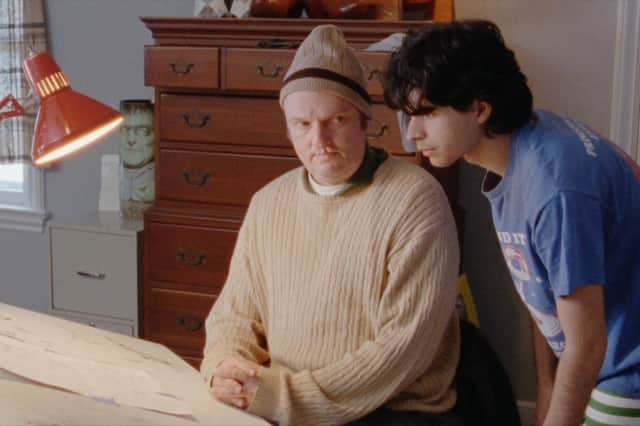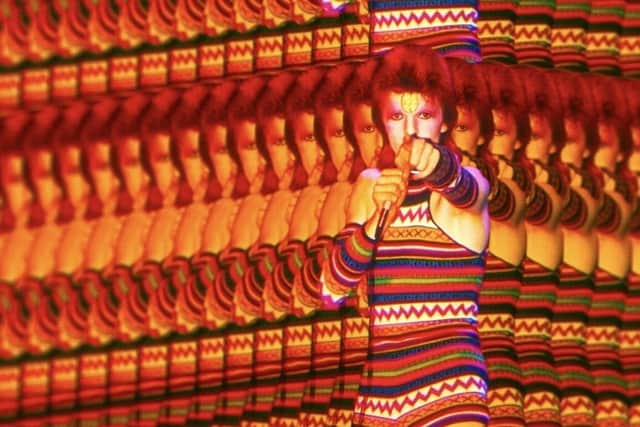Film reviews: Funny Pages | Moonage Daydream | Hallelujah | Clerks III


Funny Pages (18) ****
Moonage Daydream (15) ****
Hallelujah: Leonard Cohen, A Journey, A Song (12A) ****
Clerks III (15) **
Zeroing in on the murky world of underground comics and the extreme personalities that sometimes gravitate towards them, Funny Pages is a darkly funny coming-of-age story about a privileged high school student so determined to make authentically grubby work that he embarks on his own deranged attempt to accrue the necessary life experience for inspiration.
Written and directed by Owen Kline – best known for playing Jesse Eisenberg’s younger brother in Noah Baumbach’s The Squid and the Whale – the film establishes its uncomfortably funny tone from the off with high school student Robert (Daniel Zolghadri) getting an inappropriately eye-opening lesson in life-drawing from his teacher before witnessing a tragedy that may or may not have a negative impact on his psyche going forth.
Advertisement
Hide AdDeprived of a deprived childhood by his despairing upper-middle-class parents (Maria Dizzia and Josh Pais), Robert elects to drop out of school, take a low-paying job in a legal aid firm and move into a fetid basement apartment with a couple of middle-aged weirdoes who get off on the same kind of fringe culture that he does. Here Kline displays a wonderful feel for the grotesqueries of life on the margins, with the sweaty, claustrophobic production design and Sean Price Williams’s grainy cinematography capturing the icky reality Robert wants to exploit for his art. Whether or not he should is a question the film explores through his growing obsession with a former cartoonist (Matthew Maher) whose legal woes bring him into the orbit of his day job. The uneasy relationship that develops between them exposes in discomfiting and amusing ways the disparity that exists between suffering for your art and simply suffering.


The new David Bowie documentary Moonage Daydream doesn’t go in for an easy, chronological analysis of the iconic star’s life and career. Like director Brett Morgan’s previous film, Kurt Cobain: Montage of Heck, it’s an immersive, somewhat abstract attempt to do justice to the creative complexities of a musician who mostly resisted being commodified by the mainstream rock establishment. That’s a smart move. Bowie thrived on reinvention and obfuscation and the film embraces these traits by exploring how his reinventions drove, reflected or redefined culture at large, with the man himself fully cognisant of the allure of the rock star’s role as a false prophet in an age of declining religious significance.
Bowie’s slipperiness continues to be part of his appeal, of course, and its fascinating to see the extent to which the alien rockstar Ziggy Stardust was a world away from the Thin White Duke of his LA days, just as the peripatetic life he carved out for himself in Berlin in the late 1970s stood in marked contrast to the corporate megastar he became in the 1980s, or indeed, the internet pioneer of the late 1990s/early 2000s. Morgan’s film jumps back and forth between these periods and personalities, making judicious use of a wealth of incredible archival footage to provide a portrait of an artist who, as one surprisingly astute talkshow host puts it, used himself as his own canvas.
On the surface Hallelujah: Leonard Cohen, A Journey, A Song seems a much more conventional rock doc. Yet it’s innovative in its own quiet way thanks to directors Danye Goldfine and Daniel Geller’s decision to examine their subject’s life and career through the prism of his most famous song.
The film brilliantly teases how Hallelujah’s ubiquity and reach far exceeds that of its composer, who spent years deliberating over its every line, only for the album it finally appeared on – 1984’s Various Positions – to be rejected by Cohen's record label in the US. As such, the song’s subsequent rise from obscurity makes for a fascinating story, one involving Bob Dylan, John Cale, tragic indie-folk troubadour Jeff Buckley and, weirdly enough, the kids’ movie Shrek. The end result is a film that subtly reclaims the song for Cohen and his fans while acknowledging its importance to those who know nothing about who wrote it or why.


“Nobody’s ever made a movie set in a convenience store,” observe several characters in Clerks III. Sadly the winking nature of this joke is about as good as it gets in Kevin Smith’s real-time sequel to his furiously funny 1994 debut Clerks and its less-than-stellar 2006 follow-up.
Advertisement
Hide AdPicking up the action 16 years on from the last film, it finds protagonists Dante and Randal (once again played by Brian O’Halloran and Jeff Anderson) still running the Quick Stop they bought and re-opened at the end of of Clerks II. This time out, though, their very middle-aged ennui is interrupted by perpetual wise-ass Randal suffering a near-fatal heart attack, a wake-up call that convinces the 50-something slacker to stop being a passive consumer of his own life and make a movie about it instead.
Inevitably Randal’s film starts to look and sound an awful lot like Smith’s black-and-white indie milestone – a meta touch that Smith doesn’t quite have the filmmaking chops to pull off. It’s a shame because he’s scratching at some interesting themes, yet the mix of juvenilia and extreme sentimentality work against it, as do the diminishing acting skills of his original cast, who mug for the camera like suddenly self-conscious kids forced to pose for a school photo.
Advertisement
Hide AdFunny Pages is in cinemas and on Curzon Home Cinema from 16 September; Moonage Daydream is in IMAX cinemas from 16 September and on general release from 23 September; Hallelujah: Leonard Cohen, A Journey, A Song and Clerks III are in cinemas from 16 September.